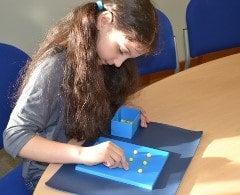
Current Projects
Building a Social Brain: Overview
The Brain and Social Cognition Lab investigates the factors that shape development of social understanding, and examines how this understanding interacts with and influences real-world social behavior (e.g., empathy, prosocial behaviors, social reticence/social anxiety). We use several non-invasive, child-friendly methods that measure brain activity (electrophysiology, EEG/ERP; functional near-infrared spectroscopy, fNIRS) to examine how the brain supports social understanding over infancy and childhood, when the brain is undergoing considerable organization and specialization, and when social understanding and behaviors are first beginning to emerge. We use these neuroscientific methods in combination with cognitive-behavioral assessments and observational data.
Three broad questions guide our research:
- What mechanisms, both endogenous (physiological, neural) and exogenous (socio-experiential), serve as building blocks to underlie, influence, and pace development of social cognition?
- How do the neural mechanisms supporting social-cognitive development change with time and experience?
- How do neural mechanisms for social cognition interact with and influence broader social behavior?
Answers to these questions help illuminate pathways to both adaptive and maladaptive social outcomes (e.g., competent engagement with social partners, relationship formation, prosociality; social anxiety and withdrawal, behavioral inhibition). Our work has begun with investigating how the brain supports basic and fundamental social-cognitive building blocks, and extends to investigations of how these early fundamental building blocks relate to ‘real-world’ social behavior.
Project Descriptions
 Several lab projects explore the question of how the brain supports the remarkable capability to understand behavior in terms of the mental states that guide it: beliefs, desires, intentions, knowledge, and emotions. Development of this foundational understanding–termed “Theory of Mind”–underlies our ability to make sense of and engage in human action and interaction. How do developments in the brain over infancy and childhood support developments in theory of mind? How do other factors such as parenting, temperament, and other cognitive skills (e.g., executive functioning and language) interact with brain developments to support successful theory of mind development? We are examining these questions in multiple projects that measure brain activity (e.g., EEG, ERP, fNIRS), neurotransmitters in the brain (e.g., dopamine), and several aspects of the child’s environment and temperament.
Several lab projects explore the question of how the brain supports the remarkable capability to understand behavior in terms of the mental states that guide it: beliefs, desires, intentions, knowledge, and emotions. Development of this foundational understanding–termed “Theory of Mind”–underlies our ability to make sense of and engage in human action and interaction. How do developments in the brain over infancy and childhood support developments in theory of mind? How do other factors such as parenting, temperament, and other cognitive skills (e.g., executive functioning and language) interact with brain developments to support successful theory of mind development? We are examining these questions in multiple projects that measure brain activity (e.g., EEG, ERP, fNIRS), neurotransmitters in the brain (e.g., dopamine), and several aspects of the child’s environment and temperament.
 Before the onset of formal language, infants first learn about their social environment through face-to-face interactions with their primary caregiver. Infants “face read” to learn about their caregiver’s emotions and intentions. For example, is mom sad, angry, or happy? Infants also use others’ facial expressions to acquire knowledge about their physical environment (e.g. looks to caregiver to see if a dog is safe or should be avoided). Indeed, infants’ interpretations of others’ facial expressions are fundamental to understanding their highly social world. The BASC lab is interested in the possible relationship between the brain’s neural signatures when viewing facial stimuli, and children’s later social development. What role does facial processing play in empathy, prosocial development, and later development of social anxiety? Several lab projects explore these questions in preschoolers, and school-aged children.
Before the onset of formal language, infants first learn about their social environment through face-to-face interactions with their primary caregiver. Infants “face read” to learn about their caregiver’s emotions and intentions. For example, is mom sad, angry, or happy? Infants also use others’ facial expressions to acquire knowledge about their physical environment (e.g. looks to caregiver to see if a dog is safe or should be avoided). Indeed, infants’ interpretations of others’ facial expressions are fundamental to understanding their highly social world. The BASC lab is interested in the possible relationship between the brain’s neural signatures when viewing facial stimuli, and children’s later social development. What role does facial processing play in empathy, prosocial development, and later development of social anxiety? Several lab projects explore these questions in preschoolers, and school-aged children. Caregivers are central figures in infants’ social environment, and have tremendous power to shape infants’ social experiences in the first year of life–a period of time when infants’ brains are undergoing much specialization and organization. The interactions infants have with their caregivers therefore have the potential to “wire up” the infant brain to support later more complex social behaviors as they develop. In a large-scale longitudinal project, we explore how early face-to-face interactions with caregivers shape the infant brain to support later development of social cognition behavior.
Caregivers are central figures in infants’ social environment, and have tremendous power to shape infants’ social experiences in the first year of life–a period of time when infants’ brains are undergoing much specialization and organization. The interactions infants have with their caregivers therefore have the potential to “wire up” the infant brain to support later more complex social behaviors as they develop. In a large-scale longitudinal project, we explore how early face-to-face interactions with caregivers shape the infant brain to support later development of social cognition behavior.We Would Love to Have You Visit Soon!
Address
202 Cousteau Place
Davis, CA 95616
Telephone
(530) 341-3002
basclab@ucdavis.edu
